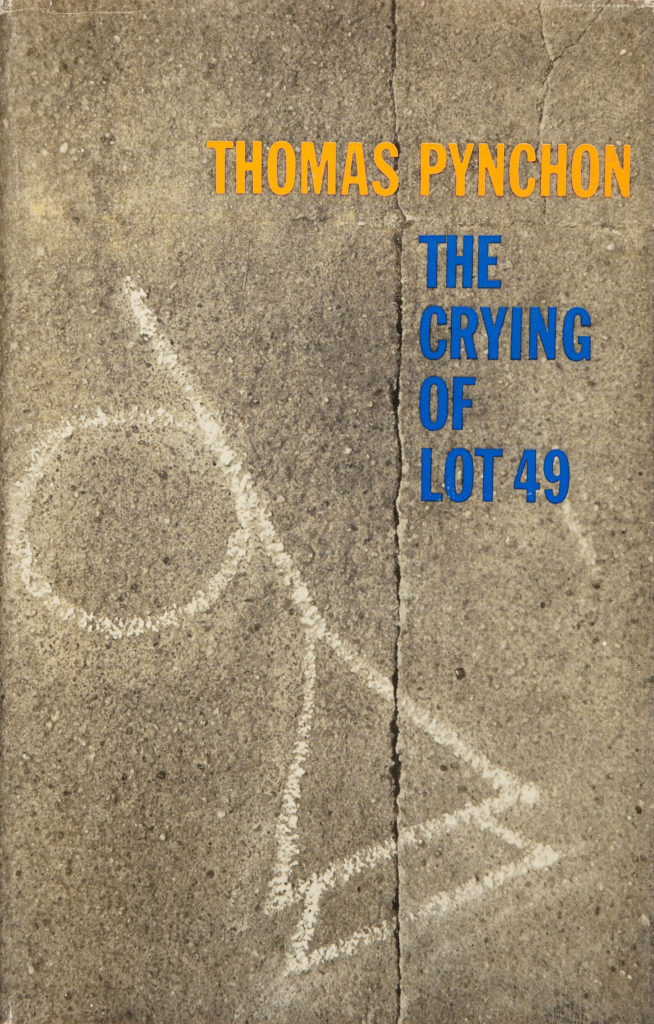
Thursday
Given post office slowdowns, whether through the Postmaster General’s malevolence or incompetence, there are real questions about whether we’ll have free and fair elections in November. I’ve written in the past about Thomas Pynchon’s Crying of Lot 49, maybe the greatest work revolving around mail delivery. The novel reads differently in light of the various Q-Anon conspiracy theories that are gripping sections of America, however.
In Pynchon’s novel, there is an underground mail organization called “the Tristero” that has been rebelling against state-run mail monopolies for hundreds of years. Call it a rebellion against the postal deep state. Tristero has drop boxes and stamps that, while they appear to have errors, are familiar to those who know the code. If the symbol of the mail service in many countries is the post horn, Tristero responds with with its own muted horn (see picture above), which is chalked up as graffiti in various locations.
Protagonist Oedipa Maas has come into possession of a set of stamps that may have been issued by the Tristero. She sets out to discover whether the underground organization actually exists, and at the novel’s end she is attending a stamp auction, awaiting to see who will be bidding on “Lot 49.” We never learn.
Maybe the Tristero exists or maybe it’s just a paranoid wish fulfillment, the desire for an alternate postal service and alternate reality. Life is becoming so complex in Pynchon’s America that one can see the yearning for something outside the bureaucratic state. In other words, the novel may identify that the yearning that draws many to conspiracy theorie.
Regardless of such yearning, one can’t imagine the Tristero getting mail to the inhabitants of China Grove, Mississippi, which is where Eudora Welty sets her comic short story “Why I Live at the P.O.” We watch as an aggrieved and passive aggressive postmistress walks out on her family following a feud. At one point, they try to use postcards as leverage:
So then Uncle Rondo says, “I’ll thank you from now on to stop reading all the orders I get on postcards and telling everybody in China Grove what you think is the matter with them,” but I says, “I draw my own conclusions and will continue in the future to draw them.” I says, “If people want to write their inmost secrets on penny postcards, there’s nothing in the wide world you can do about it, Uncle Rondo.”
“And if you think we’ll ever write another postcard you’re sadly mistaken,” says Mama.
“Cutting off your nose to spite your face then,” I says. “But if you’re all determined to have no more to do with the U.S. mail, think of this: What will Stella-Rondo do now, if she wants to tell Mr. Whitaker to come after her?”
“Wah!” says Stella-Rondo. I knew she’d cry. She had a conniption fit right there in the kitchen.
“It will be interesting to see how long she holds out,” I says. “And now, I am leaving.”
By the end of the story, we learn that their threatened boycott could have a tangible effect, making the post office even less cost efficient than it already is:
Of course, there’s not much mail. My family are naturally the main people in China Grove, and if they prefer to vanish from the face of the earth, for all the mail they get or the mail they write, why, I’m not going to open my mouth. Some of the folks here in town are taking up for me and some turned against me. I know which is which. There are always people who will quit buying stamps just to get on the right side of Papa-Daddy.
The U.S. Postal Service, whose existence is mandated by the Constitution, serves as one of America’s unifying institutions. If it were to be privatized, it’s hard to see communities like China Grove being served at all. While people grumble about it the way that college students grumble about the dining hall, it has a fairly high approval rating. After all, it serves everyone.
Which is how Jane Fairfax sees it in Jane Austen’s Emma. In her case, as an impoverished dependent she has to fend off intrusive but influential busybodies so that she can pick up her own mail. It’s important because she’s receiving missives from her secret fiancé:
The post-office is a wonderful establishment!” said she.—“The regularity and dispatch of it! If one thinks of all that it has to do, and all that it does so well, it is really astonishing!”
“It is certainly very well regulated.”
“So seldom that any negligence or blunder appears! So seldom that a letter, among the thousands that are constantly passing about the kingdom, is even carried wrong—and not one in a million, I suppose, actually lost! And when one considers the variety of hands, and of bad hands too, that are to be deciphered, it increases the wonder.”
“The clerks grow expert from habit.—They must begin with some quickness of sight and hand, and exercise improves them. If you want any farther explanation,” continued he, smiling, “they are paid for it. That is the key to a great deal of capacity. The public pays and must be served well.”
Jane is referring to the British rather than the American postal service but the praise is still warranted–or will be as long as it is not hamstrung by the Trump administration and those who want to privatize it.

